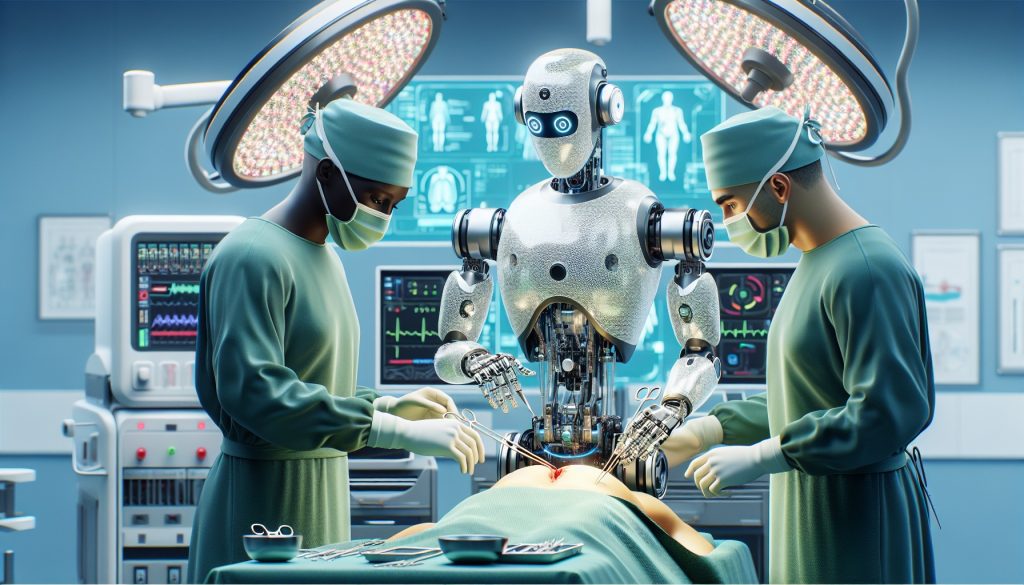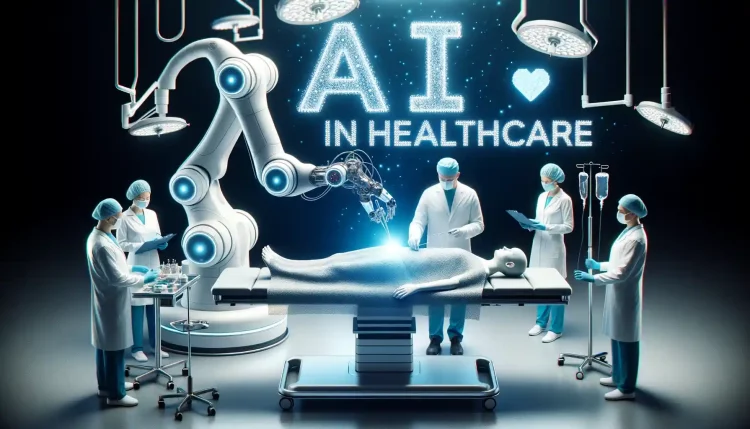Artificial Intelligence (AI) is no longer just a buzzword; it’s rapidly becoming a pivotal force in industries worldwide. In particular, the healthcare sector is experiencing revolutionary changes as AI technologies continue to enhance the way we diagnose, treat, and manage health conditions. From early detection of diseases to personalized medicine, AI is reshaping patient care and medical practices in profound ways.
In this article, we will explore the transformative role of AI in healthcare, looking at key success stories, understanding the technological innovations driving these breakthroughs, and what these successes teach us about the future of medicine.
1. Introduction: The Rise of AI in Healthcare
Historically, healthcare systems have been burdened by inefficiencies, resource constraints, and a growing demand for better patient outcomes. The integration of AI into healthcare addresses these challenges head-on, offering solutions that enhance diagnostic accuracy, reduce human error, and even predict health outcomes.
- AI’s Potential in Healthcare: AI encompasses a wide range of technologies such as machine learning (ML), natural language processing (NLP), robotics, and predictive analytics. These tools are designed to assist healthcare professionals by automating repetitive tasks, analyzing vast amounts of data, and providing insights that might otherwise go unnoticed.
- Real-Time Decision Making: With AI’s ability to process and analyze data at incredible speeds, healthcare providers can make more accurate and timely decisions, especially in critical care settings.
The healthcare industry is poised for an unprecedented transformation due to AI, but to truly understand the scale of its impact, we must look at specific use cases and case studies that have already shown promise.
2. Revolutionizing Diagnostics: Early Detection and Precision Medicine
One of the most significant breakthroughs in AI-driven healthcare is in diagnostics. Traditional diagnostic processes often involve lengthy procedures, errors due to human oversight, and delayed results. AI is streamlining this process, allowing for faster, more accurate diagnoses.
Case Study 1: IBM Watson for Oncology
- Challenge: Diagnosing and treating cancer can be one of the most complex and time-consuming tasks in medicine. Despite advanced imaging technologies and expert oncologists, the correct diagnosis and treatment plan often require multiple opinions and can vary greatly across different practitioners.
- Solution: IBM Watson for Oncology is an AI-powered system that analyzes medical literature, clinical trial data, and patient medical records to recommend treatment options. Watson’s deep learning capabilities allow it to identify patterns and make correlations between different datasets to offer insights into treatment plans that might otherwise be overlooked.
- Success: In various trials across the world, Watson for Oncology has demonstrated its ability to match treatment plans with a level of accuracy comparable to top oncologists. In India, for example, Watson for Oncology was able to recommend treatment plans in 93% of cases that matched expert oncologists’ recommendations.
Lessons Learned:
- AI can process and analyze medical data far faster and more comprehensively than any human could.
- Early adoption of AI systems requires careful monitoring and collaboration with human experts to ensure accurate and effective outcomes.
3. AI in Predictive Analytics: Preventing Diseases Before They Occur
AI’s ability to predict future health conditions based on historical data is another area where the technology is making significant strides. Predictive models are already being used to detect potential health risks long before they manifest as serious issues.
Case Study 2: PathAI in Pathology
- Challenge: Pathology, the study of tissue and blood samples, plays a crucial role in diagnosing diseases such as cancer, infections, and other chronic conditions. However, this process often involves subjective interpretation by pathologists, which can lead to variability and errors.
- Solution: PathAI is an AI platform that uses deep learning to analyze pathology images and provide more accurate diagnoses. The system helps pathologists by highlighting areas of concern that may need further investigation, improving both the speed and accuracy of diagnoses.
- Success: PathAI has shown promising results in identifying breast cancer in biopsy samples, with its AI model outperforming pathologists in some cases. By reducing the number of false positives and negatives, PathAI has the potential to significantly improve early detection rates.
Lessons Learned:
- AI can help reduce diagnostic errors and enhance the speed of diagnosis.
- Data quality and collaboration with medical professionals are key to AI’s success in predictive analytics.
4. AI in Treatment Personalization: Tailored Healthcare for Better Outcomes
Traditional medical treatments are often based on generalized protocols, which may not always be effective for every patient. AI is enabling a more personalized approach to treatment, where therapies are tailored based on an individual’s unique genetic makeup, lifestyle, and health history.
Case Study 3: Tempus and Precision Medicine
- Challenge: Precision medicine aims to treat patients based on their individual characteristics, such as their genetic makeup, rather than using a one-size-fits-all approach. However, implementing such an approach requires analyzing vast amounts of data and understanding complex genetic interactions.
- Solution: Tempus is a technology company that leverages AI and genomic data to offer personalized cancer treatments. The platform collects clinical data and molecular data from patients and applies AI models to identify the most effective treatment strategies tailored to each patient’s genetic profile.
- Success: By using Tempus’ platform, oncologists can now prescribe treatments that are more closely aligned with the patient’s biology, leading to better outcomes and fewer side effects. Tempus has partnered with major cancer centers and pharmaceutical companies to advance precision oncology.
Lessons Learned:
- AI’s ability to process genetic and clinical data opens up new possibilities for highly personalized treatments.
- Collaboration between data scientists, healthcare providers, and patients is essential for precision medicine’s success.
5. AI in Robotic Surgery: Improving Precision and Reducing Human Error
Surgical procedures, while generally safe, can be fraught with risks such as human error, tremors, and fatigue. Robotic surgery, enhanced by AI, is emerging as a transformative solution in this field, improving the precision and outcomes of surgeries.
Case Study 4: Intuitive Surgical’s Da Vinci System
- Challenge: Traditional surgeries often involve significant risk due to the limitations of human hands in delicate procedures. Surgeons may face challenges such as tremors, limited precision, or restricted range of motion.
- Solution: The Da Vinci Surgical System by Intuitive Surgical is a robotic surgery platform that allows surgeons to perform minimally invasive surgeries with enhanced precision, control, and visualization. The system uses AI to provide real-time feedback, ensuring that each movement is optimized for the best possible outcome.
- Success: The Da Vinci system has been used in thousands of surgeries worldwide, demonstrating its ability to reduce recovery times, minimize complications, and improve overall surgical outcomes.
Lessons Learned:
- AI in robotic surgery allows for enhanced precision, reducing the risk of human error.
- The integration of AI in surgery requires training and collaboration with medical professionals to ensure the technology complements human expertise.

6. AI in Healthcare Administration: Streamlining Operations and Reducing Costs
Beyond clinical applications, AI is also making an impact in the administrative side of healthcare. AI systems are automating repetitive tasks, improving scheduling, and reducing operational inefficiencies.
Case Study 5: Olive AI in Hospital Operations
- Challenge: Healthcare systems are often bogged down by administrative inefficiencies such as billing errors, insurance claim processing, and staff management.
- Solution: Olive AI is an intelligent automation platform that helps hospitals streamline their administrative operations. By automating tasks like billing, claims processing, and patient scheduling, Olive reduces the administrative burden on staff and ensures smoother workflows.
- Success: Hospitals using Olive AI have reported significant cost savings and efficiency improvements, allowing them to focus more on patient care rather than paperwork.
Lessons Learned:
- AI is not just for clinical applications; it can vastly improve administrative processes and reduce overhead costs in healthcare settings.
- Successful implementation of AI requires a strategic approach and buy-in from all levels of the healthcare organization.
7. The Future of AI in Healthcare: Challenges and Opportunities
While the impact of AI in healthcare is already being felt, there are still many challenges to overcome. These include issues related to data privacy, the need for rigorous regulation, and ensuring that AI solutions are accessible to healthcare providers around the world.
Challenges:
- Data Privacy: With sensitive health data being processed by AI systems, ensuring that privacy and security are maintained is critical.
- Regulation and Standards: The rapid development of AI technologies has outpaced regulatory frameworks, raising concerns about safety, accountability, and trust.
- Bias in AI Models: AI systems are only as good as the data they are trained on. If datasets are biased, the AI models will also reflect those biases, leading to skewed or unfair outcomes.
Opportunities:
- Global Healthcare: AI has the potential to address disparities in healthcare access, particularly in underserved or low-resource areas, by providing remote diagnostics and treatment recommendations.
- AI-Driven Drug Discovery: AI is already being used to accelerate the process of drug discovery, potentially reducing the time and cost required to bring new therapies to market.
Conclusion: A Bright Future Ahead
Artificial Intelligence is undeniably transforming the healthcare industry. As we have seen from these success stories, AI’s ability to revolutionize diagnostics, treatment personalization, surgical procedures, and even administrative functions is already improving patient outcomes and the overall efficiency of healthcare systems.
The future of AI in healthcare is promising, but it will require collaboration between healthcare providers, AI developers, policymakers, and patients to ensure that the technology is used ethically, responsibly, and effectively. The successes we’ve seen so far teach us that AI has the potential not only to improve the quality of care but also to make healthcare more accessible, affordable, and efficient for everyone.











































